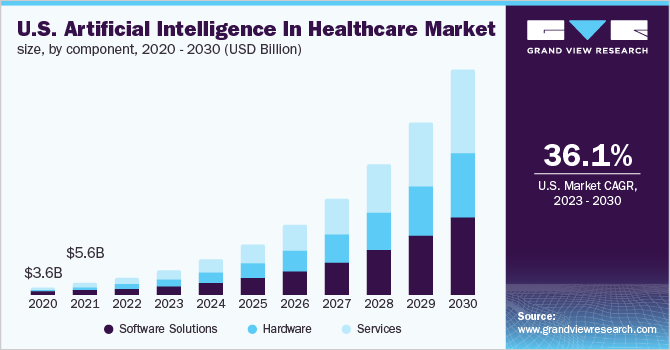
Unlocking Seamless Healthcare: How AI and Machine Learning Drive Interoperability
Introduction
As the healthcare industry undergoes rapid digital transformation, the use of technologies like artificial intelligence (AI) and Machine Learning (ML) are expected to have a significant influence on improving efficiency, quality, and scalability of healthcare outcomes. AI is already proving its worth by enhancing patient care through predictive capabilities, uncovering insights beyond human capabilities, and providing valuable context. The data generated by AI holds the potential to enable early disease detection, personalized treatments and medications, prevention of diagnostic or prescription errors, analysis of treatment risks, and much more. Clinical AI algorithms are already making strides in fields such as dermatology and radiology for image-based diagnoses, patient monitoring and management, genome interpretation, and drug discovery.
The Opportunity for AI Adoption in Healthcare
The global artificial intelligence in healthcare market size was valued at USD 15.4 billion in 2022 is expected to expand at a compound annual growth rate (CAGR) of 37.5% from 2023 to 2030. However, a survey conducted by health insurer Optum in December revealed that 85 percent of healthcare executives have developed an AI strategy, and nearly half of the executives surveyed are currently leveraging AI technology.
According to a recent survey by the Health Management Academy (The Academy), nearly half of executives (47.5%) state that their health system is presently implementing AI solutions for their workforce. The remaining majority (52.5%) indicate that their health system is in the process of assessing or contemplating the integration of AI solutions for their workforce.
This indicates a unique opportunity for healthcare and life science organizations to leverage AI for faster, safer, and more impactful outcomes.

Impact of AI and ML on Healthcare Interoperability
In the intricate world of healthcare, the seamless exchange of information is crucial. It ensures that patient data flows smoothly across different systems, allowing healthcare providers to deliver well-informed and coordinated care. Among the technological marvels that have revolutionized this landscape are Artificial Intelligence (AI) and Machine Learning (ML). These dynamic tools are not only enhancing data analysis but also playing a pivotal role in achieving healthcare interoperability.
RELATED: Why is Data Interoperability Vital for AI Adoption in Healthcare?
-
Data Integration and Standardization
- Natural Language Processing (NLP):AI-driven NLP algorithms can extract relevant information from unstructured clinical notes, documents, and free-text fields. This helps in converting unstructured data into structured formats that can be easily integrated into Electronic Health Records (EHRs) and other healthcare systems.
- Code Standardization:ML algorithms can assist in standardizing medical codes (such as ICD-10, CPT, SNOMED) across different systems, ensuring that data is consistent and compatible for healthcare interoperability.
-
Fast Healthcare Interoperability Resources (FHIR)
-
AI and ML technologies can aid in the implementation and adoption of FHIR, a modern standard for exchanging healthcare information electronically. They can assist in translating data between different formats and systems, making it easier to achieve seamless data exchange.
-
-
Data Matching and Linking
-
AI algorithms can improve patient matching accuracy, reducing the chances of duplicate records and ensuring that data is correctly linked to the right patient across different healthcare organizations.
-
-
Clinical Decision Support
-
AI and ML-based clinical decision support systems can provide healthcare providers with real-time, evidence-based recommendations and alerts. This helps in delivering more informed care, ensuring that decisions are aligned with best practices and standards.
-
-
Predictive Analytics and Risk Stratification
-
AI and ML can analyze large datasets to identify high-risk patients who may need proactive interventions. This helps in targeting resources effectively, reducing hospital readmissions, and improving population health management.
-
-
Remote Monitoring and Telemedicine
-
AI-powered remote monitoring solutions can continuously collect and analyze patient data. This information is then transmitted to healthcare providers in real-time. By integrating this data with EHRs, healthcare professionals can make timely interventions, improving patient outcomes and reducing the need for in-person visits.
-
-
Interoperable Imaging and Diagnostics
-
AI and ML algorithms in medical imaging can assist in standardizing image formats and reports, making them easily shareable across different healthcare systems and facilities.
-
-
Interoperability Testing and Validation
-
AI can be used to automate testing procedures for interoperability, ensuring that systems and applications can effectively exchange data and communicate with one another.
-
-
Semantic Interoperability
-
ML algorithms can enhance semantic interoperability by understanding the context and meaning of healthcare data. This helps in accurately mapping concepts and terms between different systems.
-
Overall, AI and ML technologies are instrumental in breaking down barriers to healthcare interoperability by enhancing data integration, standardization, and the seamless exchange of information across diverse healthcare systems and platforms.
Conclusion: A Unified Healthcare Future
AI and Machine Learning are not replacing the expertise of healthcare professionals but augmenting it. Together, they are driving a new era of healthcare, focused on better patient outcomes and an improved quality of life. Through accurate patient matching, enhanced clinical decision support, and sophisticated data extraction, AI is a catalyst for interoperability. As these technologies continue to evolve, the vision of a unified healthcare future is becoming a reality.
In the end, it's not just about the technology, but about how it empowers healthcare providers to deliver better, more efficient care. By embracing AI and ML, we're on a path to unlock a future where healthcare is truly seamless, patient-centered, and transformative.





